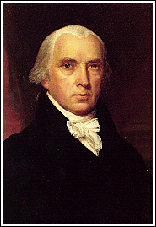FRtR > Outlines > The American Government > Explaining the Constitution: The Federalist Papers > Checks and Balances
An Outline of American Government
Explaining the Constitution: The Federalist Papers
Checks and Balances
*** Index * < Previous Chapter * Next Chapter > ***
 The Federalist Papers also provide the
first specific mention we
have in political literature of the idea of checks and balances
as a way of restricting governmental power and preventing its
abuse. The words are used mainly in reference to the bicameral
legislature, which both Hamilton and Madison regarded as the most
powerful branch of government. As originally conceived, the
presumably impetuous, popularly elected House of Representatives
would be checked and balanced by a more conservative Senate
chosen by state legislatures. (
The 17th Amendment, added in
1913, changed this provision to mandate the popular election of
senators.) On one occasion, however, Madison argued more
generally that "office should check office," and Hamilton
observed that "A democratic assembly is to be checked by a
democratic senate and both these by a democratic chief
magistrate."
The Federalist Papers also provide the
first specific mention we
have in political literature of the idea of checks and balances
as a way of restricting governmental power and preventing its
abuse. The words are used mainly in reference to the bicameral
legislature, which both Hamilton and Madison regarded as the most
powerful branch of government. As originally conceived, the
presumably impetuous, popularly elected House of Representatives
would be checked and balanced by a more conservative Senate
chosen by state legislatures. (
The 17th Amendment, added in
1913, changed this provision to mandate the popular election of
senators.) On one occasion, however, Madison argued more
generally that "office should check office," and Hamilton
observed that "A democratic assembly is to be checked by a
democratic senate and both these by a democratic chief
magistrate."
In his most brilliant essay
(Number 78), Hamilton defended the
Supreme Court's right to rule upon the constitutionality of laws
passed by national or state legislatures. This historically
crucial power of "judicial review," he argued, was an appropriate
check on the legislature, where it was most likely that "the
pestilential breath of faction may poison the fountains of
justice." Hamilton explicitly rejected the British system of
allowing the Parliament to override by majority vote any court
decision it finds displeasing. Rather, "the courts of justice
are to be considered the bulwarks of a limited Constitution
against legislative encroachments." Only the painstaking and
difficult process of amending the Constitution, or the gradual
transformation of its members to another viewpoint, could reverse
the Supreme Court's interpretation of that document.
*** Index * < Previous Chapter * Next Chapter > ***
 The Federalist Papers also provide the
first specific mention we
have in political literature of the idea of checks and balances
as a way of restricting governmental power and preventing its
abuse. The words are used mainly in reference to the bicameral
legislature, which both Hamilton and Madison regarded as the most
powerful branch of government. As originally conceived, the
presumably impetuous, popularly elected House of Representatives
would be checked and balanced by a more conservative Senate
chosen by state legislatures. (
The 17th Amendment, added in
1913, changed this provision to mandate the popular election of
senators.) On one occasion, however, Madison argued more
generally that "office should check office," and Hamilton
observed that "A democratic assembly is to be checked by a
democratic senate and both these by a democratic chief
magistrate."
The Federalist Papers also provide the
first specific mention we
have in political literature of the idea of checks and balances
as a way of restricting governmental power and preventing its
abuse. The words are used mainly in reference to the bicameral
legislature, which both Hamilton and Madison regarded as the most
powerful branch of government. As originally conceived, the
presumably impetuous, popularly elected House of Representatives
would be checked and balanced by a more conservative Senate
chosen by state legislatures. (
The 17th Amendment, added in
1913, changed this provision to mandate the popular election of
senators.) On one occasion, however, Madison argued more
generally that "office should check office," and Hamilton
observed that "A democratic assembly is to be checked by a
democratic senate and both these by a democratic chief
magistrate."